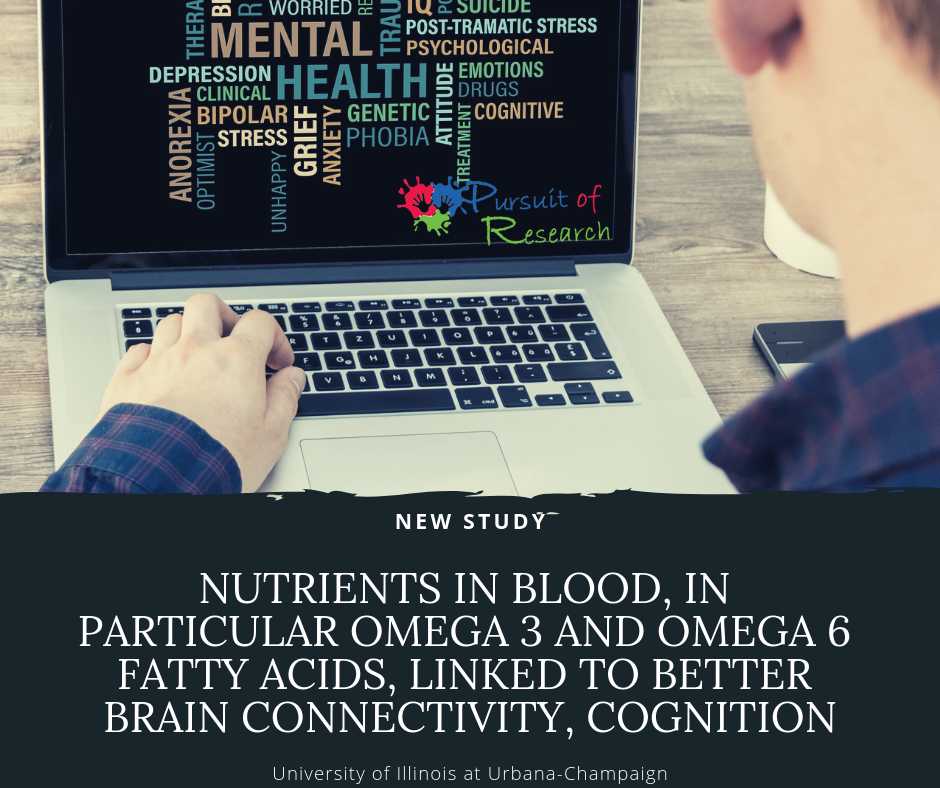A new study links higher levels of several key nutrients in the blood, in particular, a pattern of omega-3 and omega-6 fatty acids, with more efficient brain connectivity and performance on cognitive tests.

There has been misinformation on the internet and in particular by new parents who do not have any background in medicine or nutrition regarding Omega 6s which are essential fatty acids due to a theory by a lone osteopath. Omega 6 fatty acids are essential to us as humans along with Omega 3 fatty acids. In addition, the Omega 6 fatty acid
Adding to the research on the link above, a new study links higher levels of several key nutrients in the blood, in particular, a pattern of omega-3 and omega-6 fatty acids, with more efficient brain connectivity and performance on cognitive tests.
The fish oil formula we found best in this group is an Omega 3/6 formula
Nutrients in blood linked to better brain connectivity, cognition
- Date: December 19, 2018
- Source: University of Illinois at Urbana-Champaign
Summary: A new study links higher levels of several key nutrients in the blood with more efficient brain connectivity and performance on cognitive tests.
The study, reported in the journal NeuroImage, looked at 32 key nutrients in the Mediterranean diet, which previous research has shown is associated with better brain function in aging. It included 116 healthy adults 65-75 years of age.
“We wanted to investigate whether diet and nutrition predict cognitive performance in healthy older adults,” said University of Illinois postdoctoral researcher Christopher Zwilling, who led the study with U. of I. psychology professor Aron Barbey in the Beckman Institute for Advanced Science and Technology.
The analysis linked specific patterns of a handful of nutrient biomarkers in the blood to better brain health and cognition. The nutrient patterns included omega-3 fatty acids, which are abundant in fish, walnuts and Brussels sprouts; omega-6 fatty acids, found in flaxseed, pumpkin seeds, pine nuts and pistachios; lycopene, a vivid red pigment in tomatoes, watermelon and a few other fruits and vegetables; alpha- and beta-carotenoids, which give sweet potatoes and carrots their characteristic orange color; and vitamins B and D.
The researchers relied on some of the most rigorous methods available for examining nutrient intake and brain health, Barbey said. Rather than asking participants to answer food-intake surveys, which require the accurate recall of what and how much participants ate, the team looked for patterns of nutrient “biomarkers” in the blood. The team also used functional magnetic resonance imaging to carefully evaluate the efficiency with which various brain networks performed.
“The basic question we were asking was whether diet and nutrition are associated with healthy brain aging,” Barbey said. “And instead of inferring brain health from a cognitive test, we directly examined the brain using high-resolution brain imaging.”
Functional MRIs can indicate the efficiency of individual brain networks, he said.
“Efficiency has to do with how information is communicated within the network,” Barbey said. “We looked at ‘local efficiency’ — how well information is shared within a spatially confined set of brain regions — and also ‘global efficiency,’ which reflects how many steps are required to transfer information from any one region to any other region in the network.
“If your network is more efficiently configured, then it should be easier, on average, to access relevant information and the task should take you less time,” he said.
Participants also completed several cognitive tests.
The analysis found a robust link between higher levels of several nutrient biomarkers in the blood and enhanced performance on specific cognitive tests. These nutrients, which appeared to work synergistically, included omega-3 and omega-6 fatty acids, carotenoids, lycopene, riboflavin, folate, vitamin B12 and vitamin D.
The analysis also revealed that a pattern of omega-3s, omega-6s and carotene was linked to better functional brain network efficiency.
Different nutrient patterns appeared to moderate the efficiency in different brain networks. For example, higher levels of omega-3 fatty acids paralleled the positive relationship between a healthy frontoparietal network and general intelligence. The frontoparietal network supports the ability to focus attention and engage in goal-directed behavior.
“Our study suggests that diet and nutrition moderate the association between network efficiency and cognitive performance,” Barbey said. “This means that the strength of the association between functional brain network efficiency and cognitive performance is associated with the level of the nutrients.”
To test the stability of the nutrient-biomarker patterns over time, the researchers invited 40 participants back for a second analysis roughly two years after the first tests. Similar nutrient patterns persisted in this subset of the original group.
“Because we’re investigating how groups of nutrients work together, we’re getting a more accurate snapshot of how the body processes these nutrients and how they can impact the brain and cognitive health,” Zwilling said. “Of course, future studies are needed to affirm and extend these results.”
LISA GENG
Lisa Geng is an accomplished author, mother, founder, and president of the CHERAB Foundation. She is a patented inventor and creator in the fashion, toy, and film industries. After the early diagnosis of her two young children with severe apraxia, hypotonia, sensory processing disorder, ADHD, and CAPD, she dedicated her life to nonprofit work and pilot studies. Lisa is the co-author of the highly acclaimed book “The Late Talker” (St Martin’s Press 2003). She has hosted numerous conferences, including one overseen by a medical director from the NIH for her protocol using fish oils as a therapeutic intervention. Lisa currently holds four patents and patents pending on a nutritional composition. She is a co-author of a study that used her proprietary nutritional composition published in a National Institute of Health-based, peer-reviewed medical journal.
Additionally, Lisa has been serving as an AAN Immunization Panel parent advocate since 2015 and is a member of CUE through Cochrane US. Currently working on her second book, “The Late Talker Grows Up,” she also serves as an executive producer of “Late Talkers Silent Voices.” Lisa Geng lives on the Treasure Coast of Florida.